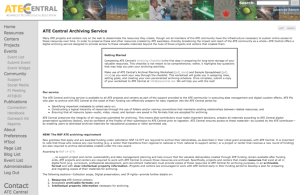
The newest NSF ATE RFP stipulates that grantees funded under this solicitation archive appropriate materials and resources with ATE Central. In the following interview, Kendra Bouda - ATE Central's Metadata and Information Specialist - defines archiving in the context of ATE, and explains why it’s important for ATE projects and centers to think about archiving early in their funding cycle. She also touches on the new NSF ATE requirements, outlines licensing protocols, and offers advice for grantees just getting started with the process.
Craig Hase: There’s been a lot of talk about archiving lately. Could you tell me a little about what archiving is and why ATE projects and centers should archive their materials?
Kendra Bouda: While the most recent ATE RFP—the one released this past October—was the first to make explicit mention of archiving, NSF has been requiring that ATE applicants submit a data management plan, or DMP, for close to four years now. The purpose of the DMP is to ensure that data generated with ATE funds are stored and shared with broader audiences. Archiving serves much the same purpose; in fact, archiving with ATE Central may very well be a strategy outlined in a project or center’s DMP.
An archive, in the simplest of terms, is a collection of materials that is preserved for its enduring value. While archives come in all shapes and sizes, the ATE Central archive is a virtual space where deliverables and select administrative documents that have been created by ATE projects and centers are collected, stored, and made publically available in a digital format. By storing materials with ATE Central, projects and centers can rest assured that their materials will remain accessible after their funding cycle is complete.
Craig Hase: ATE Central offers an archiving service specifically for members of the ATE community. Can you tell me a little about that?
Kendra Bouda: Sure. The ATE Central archiving service is available to all ATE projects and centers, both past and present. Essentially, we work individually with each project or center to navigate the archiving process, one step at a time. While the process itself can vary widely, we help in selecting materials for archiving, import and upload materials to ATE Central servers, and create unique resource records, similar to the library catalog records we’re all familiar with. Those resource records are freely available via the ATE Central resource portal. We’re also happy to provide any additional assistance that ATE projects or centers might need in archiving their materials with us.
Craig Hase: What needs to be archived under the new NSF ATE requirement?
Kendra Bouda: Grantees who apply for and are awarded funding under the newest solicitation are required to archive their deliverables, as described in their initial grant proposals. This requirement pertains to anyone who receives new funding in this coming year or in the years that follow. New funding includes not only grantees who are funded for the first time but also, let’s say, a center that transitions from a regional to a national center or a project that receives a second round of funding. Projects or centers funded under earlier RFPs aren’t required to archive, but are strongly encouraged to do so. If a project or center is unclear on whether they are required to archive, they are more than welcome to contact me with questions.
Craig Hase: Let’s talk licensing. What do ATE members need to know?
Kendra Bouda: NSF suggests that ATE grantees license materials created with the support of the grant under either the 3.0 Unported or 3.0 United States version of the Creative Commons Attribution, Attribution-ShareAlike, or Attribution-NonCommercial-ShareAlike license. These licenses allow others to copy, distribute, or adapt the licensed materials as long as users properly attribute the materials in the manner specified.
Also, NSF expects that computer software source code developed with ATE grant funds be released under any open license acceptable to the Free Software Foundation or the Open Source Initiative. All licenses must be affixed to the material and clearly displayed.
Craig Hase: What advice do you have for ATE members who are just getting started with archiving?
Kendra Bouda: Get started early! The sooner you prepare to archive with ATE Central, the easier it’ll be. Even if you’re already mid- or even at the end of your grant, it’s certainly not too late. Take a look at the information on our website, and check out our archiving checklist and worksheet. Most importantly—and I can’t stress this enough—don’t be afraid to ask for help. That’s what we’re here for.

 Subscribe
Subscribe


 See More ATE Impacts
See More ATE Impacts

Comments
There are no comments yet for this entry. Please Log In to post one.